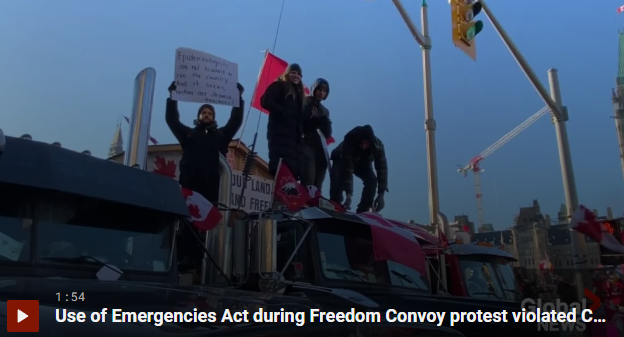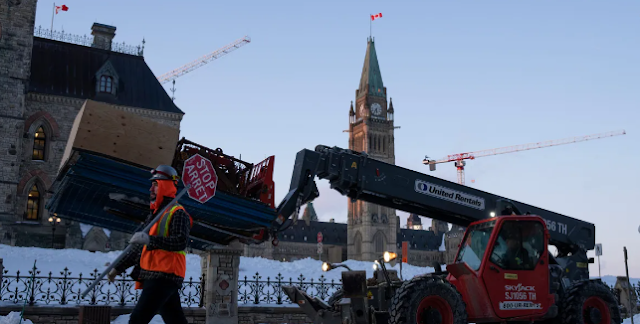Federal Court finds Emergencies Act for
‘Freedom Convoy’ violated Charter
The Federal Court has ruled the Trudeau government’s decision to invoke the Emergencies Act during the so-called “Freedom Convoy” that descended on Ottawa in 2022 violated the Charter of Rights and Freedoms.
In his ruling, Justice Richard G. Mosley said the move was “unreasonable” and outside the scope of the law. Mosley is a 21-year veteran of the Federal Court and is a respected voice on national security legal matters. He has weighed in on some of the most high-profile recent cases in Canadian intelligence, including a 2016 decision that found CSIS had been illegally storing Canadians’ communication data for more than a decade.
The case was brought forward by the Canadian Civil Liberties Association (CCLA), the Canadian Constitution Foundation, Canadian Frontline Nurses and a handful of individuals.
Mosley wrote, “I have concluded that the decision to issue the Proclamation does not bear the hallmarks of reasonableness — justification, transparency and intelligibility — and was not justified in relation to the relevant factual and legal constraints that were required to be taken into consideration.”
“I think it’s in the interest of this government and future governments and all Canadians that the threshold to invoke the Emergencies Act remains high and that it is truly, as Justice Mosley says, a legislation of last resort,” CCLA lawyer Ewa Krajewska told Global News.
Deputy Prime Minister Chrystia Freeland says that Ottawa will appeal the ruling.
Why is it in the best interests of Canada to appeal this ruling? The appeal should be paid for by the Liberal Party.
“We respect very much Canada’s independent judiciary, however we do not agree with this decision, and respectfully we will be appealing it,” Freeland said at the cabinet retreat in Montreal.
Freeland, flanked by Attorney General Arif Virani and Public Safety Minister Dominic LeBlanc, said that in the opinion of the government public, national and economic security was under threat during the protest, and said the decision to invoke the Emergencies Act for the first time was a “hard decision.”
“We were convinced at the time – I was convinced at the time – it was the right thing to do. It was the necessary thing to do. I remain and we remain convinced of that,” Freeland said.
Krajewska said it’s not unexpected the federal government is appealing the decision, but is surprised to see this intent announced so quickly.
“I hear the ministers that they sincerely felt that they were doing the right thing and invoking it, but they misapprehended the legal threshold that needed to exist in order for them to invoke it,” she said.
“They felt that they needed to react to the situation, and this was the best reaction. But it wasn’t.”
LeBlanc discussed how the situation expanded beyond Ottawa to the Ambassador Bridge in Windsor, a key trade route with the United States, and the Coutts border crossing in Alberta.
“It’s not banal when security services tell you that they found two pipe bombs and 36,000 rounds of ammunition and ended up laying criminal charges as serious as conspiracy to commit murder and assaulting peace officers. So the context is important,” LeBlanc said.
Four people were charged with conspiracy to commit murder that were associated with the border blockade in Coutts.
Much of the Coutts blockade was cleared prior to the February 14, 2022 declaration of a public order emergency, the first step in invoking the act.
The CCLA successfully argued that the existing laws of Canada were sufficient in dealing with the blockades and extraordinary powers granted by the Emergencies Act were not needed.
During the Public Order Emergency Commission (POEC), Justice Paul Rouleau said that the decision to invoke the act met the “very high threshold” outlined in the legislation.
The Public Order Emergency Commission was required under the law, which states that any time the Emergencies Act is invoked there must be an inquiry to probe whether the use was warranted and that the work on that needs to begin within 60 days.
Krajewska pointed out that while Rouleau’s report found the government was justified, he pointed out people could reasonably disagree with his decision and it was not a legal analysis.
What does the court ruling reveal?
The ruling includes a secret February 2022 memo from the Privy Council Office (PCO), the central government department that supports the prime minister, recommending Trudeau invoke emergency powers.
The document, which was partially censored and marked “cabinet confidence” – some of the most sensitive information in the federal government – noted that PCO believed the “examples of evidence to date” support the conclusion that the Emergencies Act was required.
Although from the outset, PCO noted their conclusion could be challenged.
“While there is no current evidence of significant implications by extremist groups or international sponsors, PCO notes that the disturbance and public unrest is being felt across the country and beyond the Canadian borders, which may provide further momentum to the movement and lead to irremediable harms – including to social cohesion, national unity, and Canada’s international reputation,” the document read.
“In PCO’s view, this fits within the statutory parameters defining threats to the security of Canada, though this conclusion may be vulnerable to challenge.”
Nevertheless, Canada’s most senior bureaucrat at the time – Clerk of the Privy Council Janice Charette – approved the memo recommending the Emergencies Act be invoked.
PCO’s recommendation noted that “while municipal and provincial authorities have taken decisive action in key affected areas,” the situation was “concerning, volatile and unpredictable.”
“In addition, PCO is of the view that this is a national emergency situation that is urgent, critical, temporary and seriously endangers the health and safety of Canadians that cannot be effectively dealt with uniquely by the provinces or territories,” the document reads.
Krajewska tells Global News that the document was first produced during POEC, and the CCLA had it submitted to the court during this case.
“I think it’s very important from a democracy and transparency perspective that the government produced this document during POEC and that it’s now been appended to this decision,” Krajewska said.
“It’s important for Canadians to understand how the decision was made and what information the government had before it when it was making this decision.”
The document is a remarkable window into the advice Trudeau was getting from the public service during the crisis. Cabinet documents are very rarely released, and even the censored version contained some revelations.
For instance, it shows PCO was in active talks with the Canadian Armed Forces (CAF) about how the military might assist in ending the protests should they be required.
“Nothing in the invocation implies a role for the Canadian Armed Forces (CAF) in the response to this emergency. Planning does continue to explore whether, how and when military assets could be used to advise and assist with the management of the situation,” the document read.
“This could include CAF providing available resources and equipment support such as towing operations. CAF could also be deployed to support law enforcement in certain situations, in response to a request from a province/territory.”
Global News had obtained documents in August 2022 indicating the same, and reported that Canada’s defence chief receiving a legal memo that appeared to address questions around the role of the military in aiding law enforcement minutes after the invocation was announced.
Defence experts at the time said the Canadian military faced an “exceptional” and “unprecedented” challenge in determining what — if any — role it could play in clearing the demonstration.
The PCO memo revealed on Tuesday also notes that while Premier Doug Ford was an enthusiastic supporter of Trudeau invoking emergency powers, other premiers were more skeptical.
“A large number of other premiers expressed concern about the need to act carefully to avoid enflaming the underlying sentiment they considered to lie behind the protest, which they linked to public health measures including vaccine mandates,” the document read.
“These premiers were not seeing the local manifestations of this movement yet in their jurisdiction.”
Quebec Premier François Legault “had a strong negative reaction to the proposal, saying that he would oppose the application of federal emergency legislation in Quebec,” where the memory of Trudeau’s father invoking the War Measures Act during the FLQ crisis is still alive.
Pierre Trudeau's overreaction in Quebec was greatly exaggerated by his pathetic son. At least in the Quebec crisis, there were kidnappings, murders, and bombs exploding. In Ottawa, there was nothing worse than a little noise and a big traffic jam. Justin's reaction was like that of a scared, little boy.
















